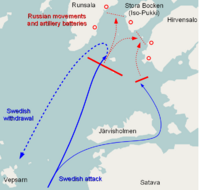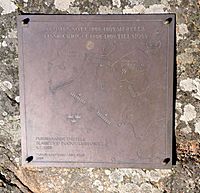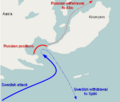Battle of Rimito Kramp facts for kids
Quick facts for kids Battle of Rimito Kramp |
|||||||
|---|---|---|---|---|---|---|---|
| Part of the Finnish War | |||||||
|
|||||||
| Belligerents | |||||||
| Commanders and leaders | |||||||
| Strength | |||||||
| 4 galleys 15 gun sloops 4 sloops Reinforcements: 4 galleys |
4 gun sloops 3 gun yawls Reinforcements: 5 gun sloops |
||||||
| Casualties and losses | |||||||
| 1 gun sloop sunk 2 gun sloops damaged |
2 gun yawls damaged | ||||||
The Battle of Rimito Kramp was a naval fight between Sweden and Russia. It happened during the Finnish War (1808–1809). This battle took place in the Finnish islands, near a place called Airisto.
Contents
What Happened at Rimito Kramp?
The Swedish Plan to Attack
A Swedish naval group, led by Commander Hjelmstjerna, had an important job. They needed to stop a Russian coastal fleet that had gotten past a Swedish blockade. The Swedes found a small group of Russian gun sloops in a weak spot. This was at the southern end of the Airisto area. Hjelmstjerna decided it was a good time to attack.
The Russian Defenses
The Russian ships were in a small bay at Rimito Kramp. Their position was very strong. They had placed their boats so they could fire from different directions. This created a "crossfire" at the bay's entrance. This made it hard for the Swedes to attack. Also, the wind was blowing against the Swedish ships. This made it difficult for them to aim their cannons correctly.
Waiting for Reinforcements
During the night, the Russians received more ships and soldiers. The Swedes expected the Russians to attack them. So, the Swedes decided to wait as well. Later, on the second day, the Swedish forces also got more ships. Hjelmstjerna then planned a new attack. He wanted to use his larger galleys and their bigger crews. His goal was to overpower the smaller Russian boats during the night.
The Russian Escape
While Hjelmstjerna was getting ready for his attack, he made a mistake. He forgot to guard a narrow passage. This passage led from Rimito Kramp towards the city of Turku. Just before the planned Swedish attack, the Russians used this passage. They quickly escaped to Turku. In Turku, they got even more help. They were supported by three large artillery batteries.
The Battle's Outcome
The Swedes had forced the Russians to retreat. But they did not manage to completely defeat the Russian coastal forces. This meant the battle was a tactical victory for Sweden, as they pushed the Russians back. However, it was a strategic failure because they didn't destroy the Russian fleet.
What Happened After the Battle?
King Gustav IV Adolf of Sweden was not happy with the navy's performance. So, he decided to take charge himself. He arrived on July 4th to Hjelmstjerna's naval group near Turku. He wanted to attack the Russians as soon as possible. He hoped to stop the Russian naval forces from joining up.
The Battle of Pukkisaari
The Swedish forces launched another attack towards Turku. This battle is also known as the Battle of Pukkisaari or Battle of Bockholmssund. The Russians, led by Lieutenant General P.K. Konovnitsin, formed a line with their gun sloops and yawls. They positioned themselves between the islands of Ruissalo and Hirvensalo. They also had help from artillery batteries on the shore. Russian infantry (sharpshooters) were placed on the shores of Ruissalo and Hirvensalo.
The battle started at 6:00 PM and lasted until midnight. The Russian line bent under the Swedish attack. But the Swedes could not break through it completely. The battle ended without a clear winner. Eleven Russian ships were damaged. Most of the Swedish ships were also damaged.
Images for kids
 | Selma Burke |
 | Pauline Powell Burns |
 | Frederick J. Brown |
 | Robert Blackburn |




